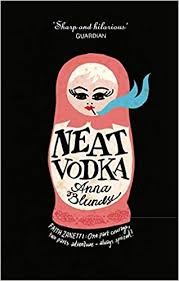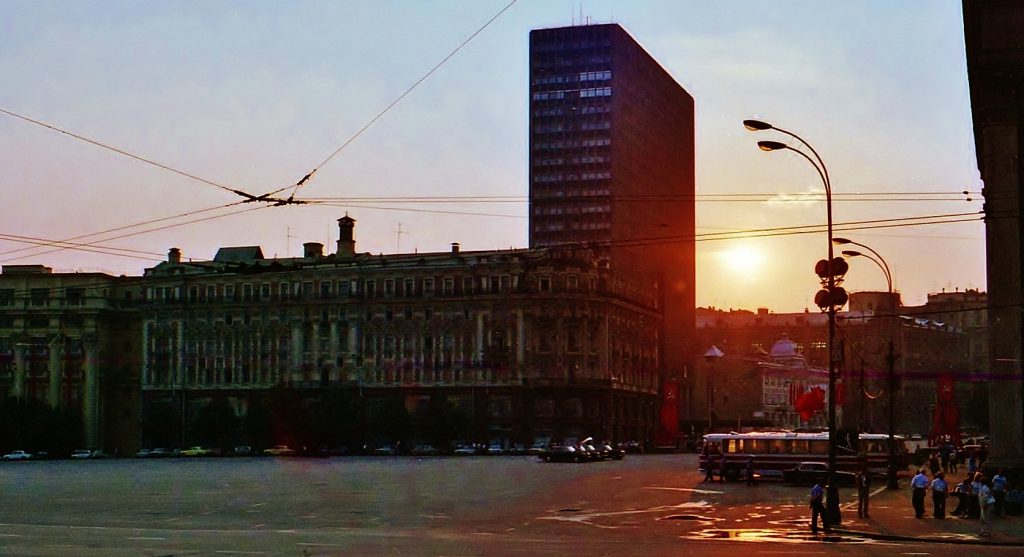Part one of this review is here.

‘It’s always strange to be back. There is something about even flying into Russian airspace that makes me relax. I’m not weird in Russia.’
So says Faith Zanetti, the first person narrator of Neat Vodka. She feels a bit like I do when I go to Russia.
Interestingly the reason why she’s not weird in Russia is that
it’s one of the few places where I’m usually the least worldly person in the room
Neat Vodka, p. 26
Nice to see a novelist refusing to fall for the myth of Russian spirituality in comparison to Western materialism.
Reminds me of a conversation I had with my Russian landlady in Moscow in the first year of this century. She had just returned from visiting her children, who had emigrated to the United States. I asked her how it was, on which she launched into a tirade against US consumerism. Then, without batting an eyelid or embracing irony, she glanced at my bag by the door and said ‘That’s a lovely bag. Where did you get it? How much was it? I’d like one.’
When Faith Zanetti arrives at Sheremetevo airport she notices a young glamorous Russian coming off the same London flight with her mother:
Mama’s hair was dyed and set, her sunglasses had been bought yesterday and she was dressed in the soft beiges and greys of enormous wealth. I smiled. Good for her. This woman, now in her 60s, must have grown up under Communism, queued for every last item of food in the 1980s, probably went out on the street with all her belongings —forks, tacky ornaments, lampshades— and laid them on a tea towel in the hope that some foreigner would buy them
… Her husband very likely died of drink years ago. And now she’s on a shopping trip to London with her daughter. Good for her.
Neat Vodka, p. 23
The book that Faith is reading on the plane en route to taking up her foreign correspondent position in Moscow is
my predecessor’s “Whither Russia?” book about the beginning of the Yeltsin era. I remember us all feeling that as Russia’s democracy emerged from the darkness of totalitarianism just about anything could happen. Would the Communists take over again? Would they get a nationalist lunatic who would start randomly executing everyone vaguely swarthy? Or would freedom triumph and herald a new age of higher living standards, flourishing arts and sciences and chickens in every pot?
Neat Vodka, p. 23
I could go on too much here about Blundy’s knack for nailing the things that old Soviet/Russia hands remember. I like the way she lands at Sheremetevo, and not Domodedevo where most international flights now arrive.

For at Sheremetyevo airport nothing has changed in 20 years. The ceiling here is a design that centres around the non-stick cake tin. There are one million of them glued on up there, and there are even light bulbs in about 40 of them. It is very bleak and gloomy and smoky and, well, basically, Russian.
Neat Vodka, p. 26
She is then driven on the straight road that goes south from Sheremetevo to Red Square, right down Moscow’s main street, on which I was privileged to live for a few months in the early 1990s.
… down Tverskaya, the road that used to be Gorky Street. Well, it was Tverskaya under the tsars, then Gorky Street, now it’s Tverskaya again. The Tsarist nostalgia makes me sad. Communism did have its downsides (gulags and what have you) but there was a lot that was wonderful about it and the tsars certainly did need getting rid of. The idea that a beautiful royal future for Russia was obliterated by the Communists is certainly a pile of crap. We trundled past Gucci, Louis Vuitton and all that stuff, the glittering shopfronts blurred by the rain. The shop where I once stood for four hours for cheese is now a Benetton. In those days there was white cheese and yellow cheese. I once asked what the cheese was, meaning what type of cheese, and the warty shop assistant scowled at me as if I was mad. “It’s cheese”, she said.
Neat Vodka, p. 30
Blundy/Zanetti gets what most Russians of a certain age think about the Soviet era. On one level it is just nostalgia, such as that for the central Moscow Intourist Hotel, an ugly concrete sky-scraper, a few hundred yards from Red Square, beloved of visiting foreign students and with a terrific view from its top-floor Tea Bar during the innocent Soviet era, before succumbing to gaudy hedonism as the Soviet state collapsed.
They pulled the Intourist hotel down. Now I’m not saying it wasn’t by far the most hideous thing ever constructed by humankind, but I spent so much of my time there as a married teenager, watching the prostitutes (all of whom Dimitri knew and some of whom he had been out with) in their fishnets and wigs smoking these tiny thin cigarettes with a flower on them and listening to the Arab students arguing in hissing secretive whispers. Gone! Flattened.
Neat Vodka, p. 130

By now I had begun to wonder whether Blundy wasn’t following me around in the early 1990s, so uncannily do her reminisces match mine. She appears to have even followed me to my flat, describing its front door to a tee.
The flat is on the ninth floor behind a big padded steel door. A fashion for these developed when crime got out of control in the early 90s. Having a steel door is unnerving as it is, but when it is padded with black leather it takes on a whole new dimension. There were four locks on it, two of the big fat metal fingers that wedge themselves into the frame at top and bottom and then two sort of cross bar things that jammed into the walls on all four sides.
Neat Vodka pp. 31-32
Or may be she was following me in 1988, when I made my one phone call in three months home to England from provincial Voronezh.
There was a time under the Soviets when quite a lot of people didn’t have a phone. If you wanted to call another city or even another country (inadvisable from a getting-hounded-by-the-KGB point of view), then you had to do it from the local post office where you would queue, sometimes for hours, to book your call and then again for a booth to become available. When one of these old wooden booths flashed free, you would go in, pick up the heavy black Bakelite receiver and quote your call number to the operator who was on the end of the line and also physically about two yards away. She, always she, would then connect you and, always, listen in just in case. It didn’t really seem like a hassle because everyone had to do it. People also sent a lot of telegrams. You would pick up a form and fill it in with one of the nibs they left on the counters, dipping it in the wooden pots of congealed ink.
Neat Vodka, p. 100
Owen Matthews describes this in similar style in his novel Black Sun, and that is set in the 1960s.
There is a depth to Blundy’s knowledge of Russia that few western popular fiction writers have. She doesn’t just write about the usual fare of Moscow and St Petes and hotels and oligarchs and prostitutes and the security services. Because she has lived there, she is able to draw on her experiences to write vividly about a visit to a prison for the mentally disturbed, about provincial Russian towns, about the vast uninhabited spaces of Siberia, and —my favourite, as I could see this happening with some of those westerners who go to Russia because of its difference, its vastness, its wild edge— the American who entered Russia with no documents in the 1990s and just stayed there without documentation, becoming Russian and yet even there living outside the system and with no proof of origin.
Part one of this review is here.
A post prompted by Faith Zanetti reading her predecessor’s “Whither Russia” book is here.